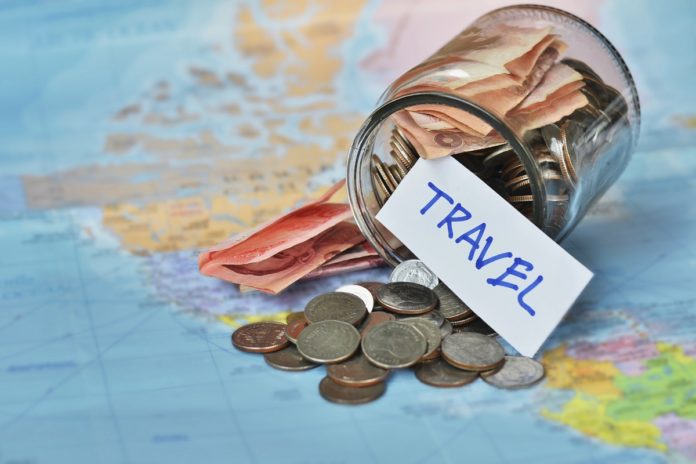
Saving money generally is a difficult task considering the factors involved in calculating income and expenses. For students, especially independent ones, saving money after expenses can be very challenging especially when it involves saving for travel.
Estimate the Travelling Cost

The first thing to do when you have an intention to travel as a student is to calculate the cost involved in embarking on the journey. Cost of transportation, feeding, shelter, sightseeing/fun, e.t.c. When you have arrived at a well-calculated estimation, you can begin to save the money for the travel.
Be Motivated

Whatever you set upon to do in life, without a willing spirit, the task is very likely to fail. Travelling comes with its huge expenses and therefore, for a pocket that needs saving days, the irresistible temptations and daily expenses should be contained and that can only happen with a spirit well motivated and focused on achieving a traveling aim through savings.
Dedicate a Savings Account for Travel

Preparing a particular saving process for your funds is the next crucial step to take in the saving business. It can either come in the form of:
Bank Savings Account
This method involves reaching out to financial institutions and opening up a savings account. With your sights set on the long term goal of traveling, you can quickly and easily direct funds that come your way to your bank account. It helps to keep the fund away from your reach and the temptations of spending it.
Local Savings
This involves creating or buying a box or container with locks, specifically for saving the little funds you wish not to spend. This method can also involve under your bed or a particular position in a place, just where you can keep the money you do not wish to spend.
It is good to note that this particular method is very risky because it leaves you exposed to the temptations of breaking the box or reaching out for the position whenever a tempting or pressing issue involving funds arises.
Get a Part-Time Job

Do you seriously wish to make that journey as a student, despite not having the funds for it? Take that bold step of taking on part-time jobs to increase your income and reduce or handle expenses perfectly. Examples of part-time jobs include:
Employment
This involves taking up a job for pay. You either get paid monthly, weekly or daily according to services rendered and agreement with the employer. You take on these jobs during your free days or free hours every working day.
Freelancing
Freelancing involves getting paid for offering services online. It ranges from writing for such services as Pro-Papers audio editing, translating, proofreading and so much more. Figure out what your talent is, what you are good at and embark on a search for the millions of people on the internet seeking your services.
Applications/sites like Fiverr, Upwork, Freelancer all offer a platform for people to share their talents and profession in exchange for payment. This method provides extra funds for savings.
Although this method of savings appears to be too stressful it is very essential for the determined soul bent on achieving a traveling aim.
Cut Your Expenses Cost

One of the very important aspects worth paying good attention to while harboring the intention of saving is to cut the cost of spending/splurging.
If you can be able to reduce the rate at which you spend, you will be able to save more. Cutting of cost of expenses includes:
Live at Home
This is specifically for those with a family house close to school. Without the additional expenses of “rent” available in your expense list, there would be more money to save.
Going to school from home will save you the additional cost of paying for a room, furnishing it, feeding and the rest of sole living expenses.
Avoid Splurging
One of the problems we humans face, especially students is the incessant spending on things we do not need. I had a friend with average income parents that gets clothes each weekend because a rich friend of ours buys every weekend as well. A wardrobe filled with clothes not worn for months will do you no good especially when it involves savings.
Monthly or Weekly Analysis of Expenses
This involves writing down every dime you spend and what it was spent on. It helps give you a reason and chance to avoid splurging and apply what you need doing to help you save more, like taking a packed lunch to school rather than pay restaurants and cycling to school rather than board a transport or fuel your car. All these help in reducing the cost of spending and increases savings.
Sell What You Do Not Need

Students have those clothes that no longer wear, those devices that no longer use or those books that no longer need. There are sites like eBay where you can upload this stuff you wish to sell. You can also advertise locally and definitely there must be people willing to splash a price on what you have to sell instead of those belonging rotting away in our cupboards, shelves or bags. This is just another way to generate income for savings and a great step taken towards reaching your traveling goals.











